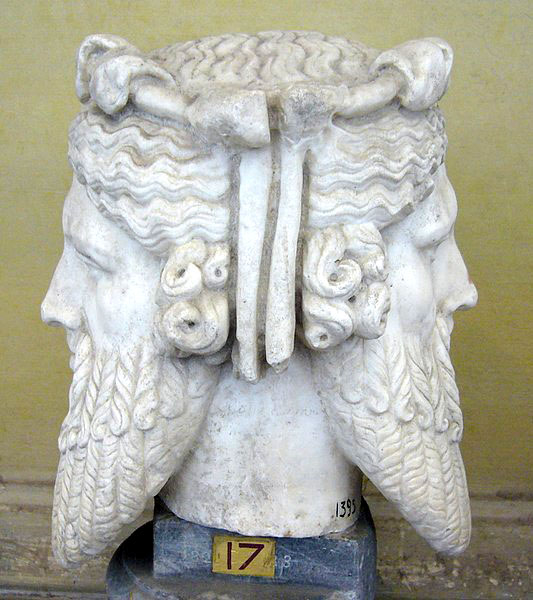 |
| Janus (Wikipedia) |
Note: Few of us stop to think about where the months of the year (or the days of the week) got their names, but there are some fascinating stories behind them! Here are the first four months in the modern calendar.
Get Ready: When you think of January, February, March, and April in the northern hemisphere, what sort of weather do you think of? What's happening in nature?
In Lesson #01-016 I wrote about the names of the last four months of the year, saying that, in the modern Western calendar, September is month number nine of twelve. However, as I noted then, septem- means "seventh" in Latin, because the ancient Roman calendar had only ten fixed months. Thus, the last four were September, October (octo- indicates eight, as in "octopus" and "octagon"), November (novem- is nine, as in "novena"), and December (decem- means ten, as in "decimal").
In the Roman calendar of ten months, the first month was March, and there were two "floating months" added in wintertime when the Roman priests thought it was necessary. Those months became January and February.
Moving now to the first four months in the modern calendar, let's see where they got their names.
- January: Some people find the name of January to be the most interesting name of all the twelve months. It is named for Janus (Latin Ianuarius), the god of doorways. The Romans believed that Janus could see both the past and the future. This puts him in a pivotal position, and often his two-faced mask could be seen over doorways, which also "look" in two directions (in and out). So in January, we look back to the previous year and forward to the new one. By the way, from the same root, we get our word "janitor," which originally meant "doorkeeper" (and most building janitors still carry a lot of keys!).
- February: The name for this month comes from the Roman feast called the Februa, which was held on the 15th of the month. This was a cleansing festival, related to the fact that this was the last month of the year (in the days when March was the first month). Remember how, once in four years, we add an extra day to the calendar to keep it in synch with the sun? But you may have wondered why we add it at the end of February. Again, because this used to be the last month of the year.
- March: Related to Mars, the god of war, this is the month when winter was over and springtime arrived, so armies could once again begin campaigning. By the way, this is not related to the verb "to march." Land boundaries used to be marked by marching around the property; the verb "march" is related to the verb "mark."
- April: You may find that the name of this month has another beautiful etymology. Although there is some dispute, it is generally believed to come from the Latin word aperire, meaning "to open," because this is the month when the flowers begin to open.
In Lesson #01-058, we'll complete the year with a look at May through August. We'll also, in summing up, examine why some people doubt that "April" refers to "opening."
--------Read more: https://en.wikipedia.org/wiki/Gregorian_calendar
Practice: Which of the four months named above:
- is a time for armies to go to war?
- refers to the opening of flowers?
- used to be the last month of the year?
- makes us think of a two-faced god?
- marks the end of winter and the start of spring?
- has a name that is in dispute?
- is named after a cleansing festival?
- is related to doors?
Answers are in the first comment below.
Submitted to the Shenzhen Daily for January 3, 2008


Answers to the Practice: 1. March; 2. April; 3. February; 4. January; 5. March; 6. April; 7. February; 8. January
ReplyDelete